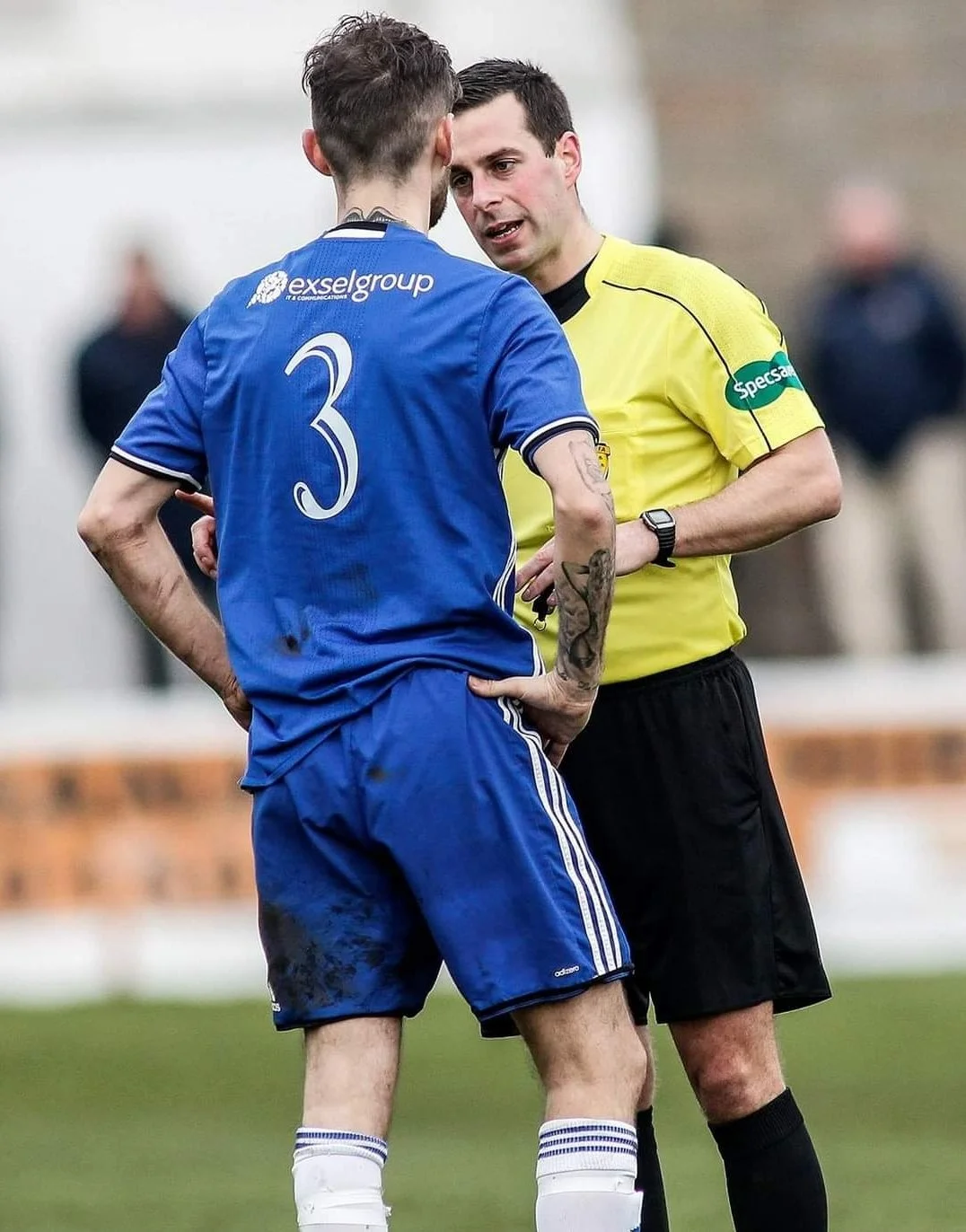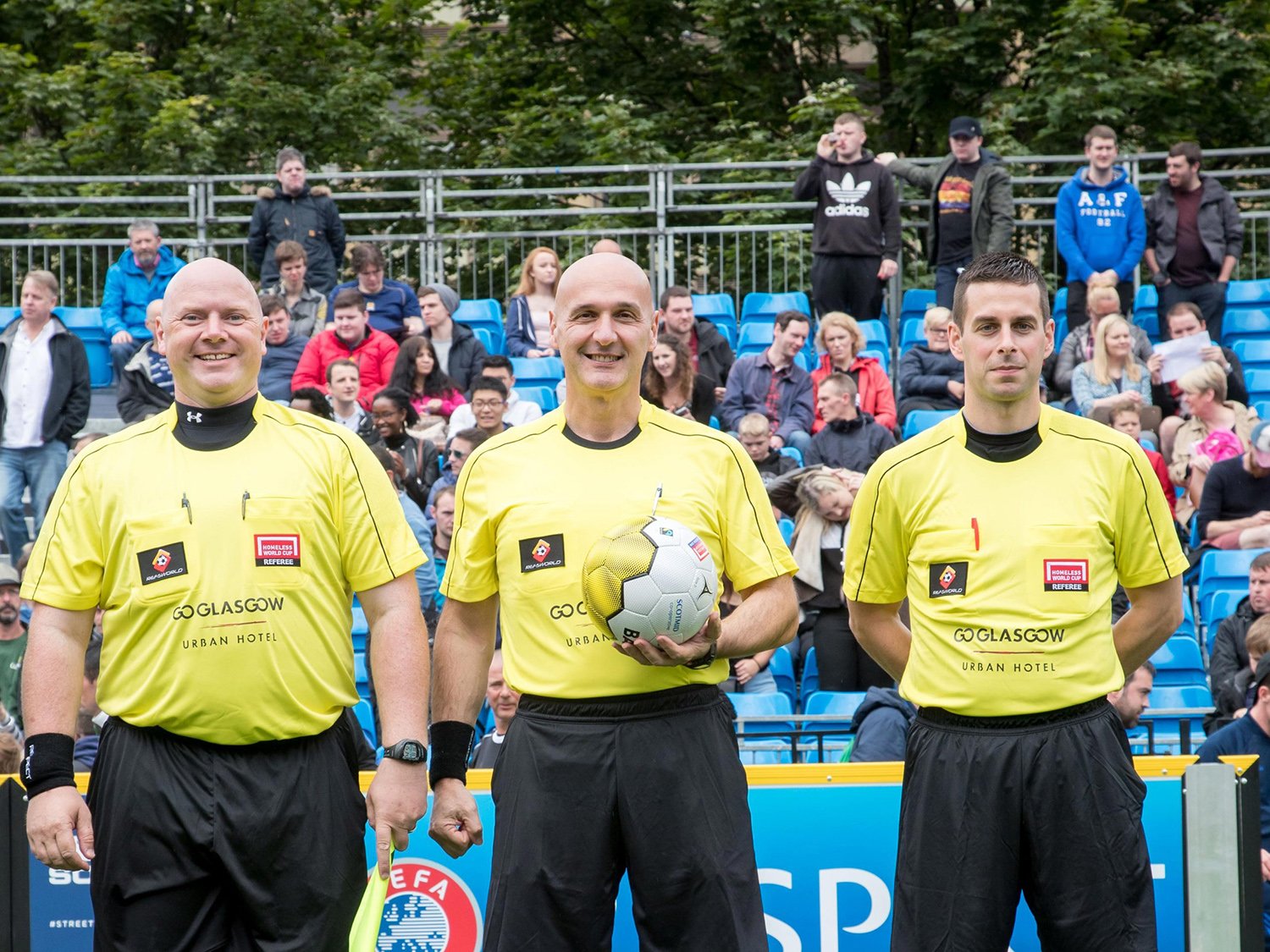For the Love of the Game
|Image: Steve Beddoes
A journey of a referee from Scottish junior football to the Homeless World Cup and the Scottish Premiership.
“My first game was Rangers vs Hearts – U11s. Which was petrifying.”
WHERE IT BEGAN
It’s 2008 and newly qualified Scottish referee Duncan Williams is ready for his first match. He’s learnt the rules of the 11-a-side game and as a former Queen’s Park and Dumbarton player he is confident. But this is a junior match, it’s seven-a-side, and the penalty box doesn’t have any markings.
“Everything I’d ever been involved in, from as long as I’d remembered, has been 11-a-side. So, you do laws of the game on 11-a-side, you do your tests based on 11-a-side football. And then all of a sudden, you’re thrown into seven-a-side football. Do they have throw-ins? Do they have kick-ins? The pitch markings are different because they’re smaller pitches. So, I felt a wee bit of a rabbit in the headlights.”
Duncan Williams in action refereeing a Scottish League 2 match.
A FRONT-ROW SEAT
It didn’t put him off and he quickly progressed through the age groups and started refereeing 11-a-side matches. Refereeing junior matches gave him front row seats to see young talent coming through. Duncan said not all of the players who make up the international team today stood out from a young age.
“Billy Gilmour was a stand out. Andy Robertson wasn’t. Kieran Tierney wasn’t. Callum McGregor, who is now captain of Celtic, he was always somebody who jumped out as a good player. Leigh Griffiths, who signed for Celtic, his very first game was a reserve game that I refereed. Getting up close with these guys you do realise that some of them are a different level and are exceptionally talented.”
It’s more than ten years since his first match between Rangers and Hearts, and Duncan is now one of 30 Category 1 referees in Scotland, qualifying him to referee the highest level of games.
HOMELESS WORLD CUP – GLASGOW 2016
He has refereed more than 800 matches, including at the Homeless World Cup in Glasgow in 2016 and Mexico in 2018. Responding to a call out from the SFA for volunteers, the tournament in Glasgow in 2016 was the beginning of his love of the Homeless World Cup.
“The whole Homeless World Cup, I can’t get enough of it. It’s a mix of my love of football and the love and a lot of self-satisfaction from giving back.”
He told us his highlights from Glasgow: his first match he refereed between Czech Republic and Belgium, a legendary Mexican overhead kick he can still replay in his head and how grateful he was to be given the opportunity to be an Assistant Referee during the women’s final between Mexico and Kyrgyzstan.
“The referees are appointed the games and they’re asked to select their two assistants. I was very fortunate to be asked to be one of the assistants for the Ladies final. Which was just unbelievable.”
“To be involved in a final on my very first tournament was just amazing. The crowd, the atmosphere, the players, everything that went with it.”
STREET FOOTBALL
It wasn’t only the atmosphere that Duncan fell in love with, he also loved refereeing four-a-side street football, a very different experience to refereeing 11-a-side.
“It’s fantastic. Street soccer is so fast, some of the skills that are involved, the fitness, the movement. As a referee, physically it’s very easy, because you move very, very little. Mentally, however many decisions you get in an 11-a-side is on a bigger pitch, you’re on such a small tight pitch that you are making decisions, you’re assessing situations all the time. So mentally it can be quite fatiguing. It’s very different from 11-a-side. Street soccer is so much quicker, the ball moves quicker, the players react that bit quicker as well because it is a much smaller confined space.”
“The rules are slightly different in terms of pass backs and bits and pieces like that so it’s also trying to remember that and ultimately keep an eye on your watch because it’s only seven minutes and it can pass very, very quickly.”
Refereeing at the Homeless World Cup gave Duncan more experience of refereeing international games, which posed its own challenges but he said ultimately made him a better referee.
“Quite often at the Homeless World Cup there is a language barrier, especially being a Scotsman trying to speak English to most people, they don’t understand you at the best of times!
But it’s helped my own personal refereeing within Scotland, in terms of using body language. If people are aggressive, you need to calm them down. So, how do you do that without saying “Calm down” because they might not understand you. It’s using arms, facial expressions, the whole-body language and not being aggressive yourself.”
|Duncan says there’s “nowhere to hide” when you’re refereeing.
Refereeing is high pressured and Duncan explains, “there’s nowhere to hide”. Referees are expected to be the fittest person on the pitch (regardless of their age) and to remain composed in difficult situations. Duncan says good decision making and people management are vital.
“You’ve got a fraction of a hundredth of a second to take a snapshot of a tackle, or a kick of the ball or whatever it may be and to take that snapshot back into your mind, process it and ultimately come out with a decision on the back of that. So, your decision making needs to be very quick and very accurate to be a good referee.”
“It can be difficult sometimes, if you have three of four players from each team giving you mouthfuls or causing you hassle, you can become flustered and it’s about taking a breath and remaining calm.”
“Ultimately if you portray yourself as out of control or aggressive or even the opposite of that, if you appear timid then players will pick up on that and they’ll react. So will the crowd. A lot of the things a referee does is about, it’s about acting – how do you sell a decision to somebody? How do you sell a decision to the players, how do you sell it to the crowd? And that comes from your positioning, your body language. To show that you are in control.”
“Sometimes you can come off the pitch and say ‘Yeah, that maybe wasn’t the best day at the office. And then it’s about building yourself back up again from there. There can be extreme highs and extreme lows. If you come off the pitch and you’ve made a major decision and you’ve got it wrong, there are livelihoods that are made by some of these decisions you can make. People can lose their jobs. Footballers can lose their contracts. Backroom staff can lose their jobs. Teams can get relegated. There is a lot at stake.”
FOR THE LOVE OF THE GAME
“The Homeless World Cup for me is a highlight of my career and my life.”
Despite this, it hasn’t changed how Duncan views football. At the beginning of each season, referees are asked to declare any conflicts of interest. For Duncan this has never been a problem, he is doing it for the love of the game.
“I’m a massive football fan. I think if you talk to probably 99.9% of referees, they are all exactly the same. I just enjoy football. No allegiances to anyone.”
Except, perhaps to his fellow international referees.
|Image: Anita Milas
“The relationships and the friendships I’ve built from the Homeless World Cup, with players and in particular, the international referees. We’re all very close. We’re all on a WhatsApp chat that’s pretty much going 24-7. The sooner it comes back the better as far as we’re concerned, we need it. So hopefully next Sunday is a success and gives me a taste of street soccer until the next Homeless World Cup.”
Duncan Williams refereed at the Four Nations Challenge Cup on 18-19th September. The two-day tournament took place in the centre of Edinburgh next to the National Gallery. It was an open event, which is free for everyone to attend.
Words: Rebecca Corbett
Images: Duncan Williams, Anita Milas & Steve Beddoes




